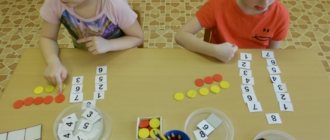Fostering hard work in the senior group
Hard work is a character trait consisting of a positive attitude towards work. Manifests itself in activity, initiative, conscientiousness, passion and satisfaction with the work process itself.
The child demonstrates satisfaction with the results of his activities to adults quite early. By declaring “I myself!”, the child tests the limits of his capabilities, his claims, which should bring joy and instill confidence.
Behind the external lightness and elegance there is always titanic work, and you need to try to make sure that systematic and hard work does not repel the child. The Russian artist Fedotov said: “Do it a hundred times, then it will be easy” - in response to someone’s phrase that, supposedly, anyone can draw like that.
Diligence presupposes an attitude towards work as the main meaning of life, the need and habit of working. To cultivate hard work, it is necessary that a person sees and understands the meaning and results of his work.
For children, the most important work is play. In play, the child’s memory, attention, thinking, and speech become arbitrary; In the game, the child masters a model of the world in a toy version and builds his own model. He creates something, creates it himself. Observing loved ones, she forms an attitude towards work as such, learns what is “female” and “male” work. He develops habits: first it is some kind of action, deed, and then a repeated series of actions, deeds leads to automatism, that is, a habit. How to fold clothes? Where to put it? How to clean up toys?
Respect for the child’s personality, careful attitude towards his interests, help and support, personal example are the optimal conditions for nurturing hard work.
We, educators, face the following tasks:
‒ Continue to expand children’s understanding of adult work. Show the results of labor and its social significance.
‒ Learn to take care of what is made by human hands. Systematize knowledge about people’s work at different times of the year.
- Talk about different professions of people.
‒ To introduce children to the work of people in creative professions: artists, writers, composers, masters of folk arts and crafts. Show the results of their work: paintings, books, sheet music, objects of decorative art.
‒ Develop a desire together with adults and with their help to carry out feasible work assignments. Teach children to finish what they start. Develop creativity and initiative when performing various types of work. Create responsibility for carrying out work assignments.
‒ Foster a work culture, careful attitude to materials and tools.
- Learn to evaluate the results of your work.
- Stimulate children’s desire to take part in work activities.
A plan was developed to instill hard work in the senior group (Table 1).
Table 1
Plan for instilling hard work in the senior group
| Month, week | Subject | Goals | Bilingual component |
| September 1 Week | Executing self-service processes "Closet Tidy" | Educational: Form a habit of order, the ability to work individually. Developmental: Develop independence. Educational: Cultivate neatness. | Tartip - order, kiim - clothing. |
| 2 week | Household work "Dining duty" | Educational: Teach the child to perform duty duties and plan their activities in pairs. Developmental: Develop a positive attitude towards work. Educational: Cultivate neatness. | Ydys ayak - dishes, kasyk - spoon, shanyshky - fork. |
| 3 week | Introduction to adult labor "Who works in kindergarten" | Educational: Learn to distinguish between adult professions based on essential characteristics Developmental: Develop the ability to navigate in the immediate environment. Educational: Foster a sense of respect for the work of adults who care for children. | Balabaksha - kindergarten, top - group, tәrbieshi - teacher. |
| 4 week | Labor in nature "Duty in a corner of nature" | Educational: Improve the ability to independently water plants, loosen the soil, wipe leaves. Developmental: Develop skills in washing large and small leaves of indoor plants. Educational: To cultivate a caring attitude towards plants. | Enbek - labor, zhapyrak - leaf, osimdik - plant. |
| October 1 Week | Teamwork "Vegetable Salad" | Educational: Generalize knowledge about vegetables. Strengthen the ability to use a knife correctly. Developmental: Develop interest in cooking. Develop attention and speech. Educational: To develop neatness and hygiene skills when preparing food. | Su - water, tazalyk - cleanliness, vegetables - kokonister, qiyar - cucumber, carrot - sabiz, cabbage - kyrykkabat, tomato - tomato. |
| 2 week | Household work “Let’s restore order in the group” | Educational: Improve the ability to independently clean up a group room. Developmental: Develop observation skills. Educational: Foster hard work. | Top - group, oyynshyk - toy. |
| 3 week | Household work "Class Duty" | Educational: Learn to independently and conscientiously perform the duties of an attendant: lay out materials and aids prepared by the teacher for the lesson on tables; put them back in place after class. Developmental: Develop a sense of responsibility. Educational: Cultivate neatness. | Kagaz is paper, karyndash is a pencil. |
| 4 week | Introduction to adult labor Role-playing game "Barbershop" | Educational: To form an idea of the work of adults. Developmental: Develop speech. Educational: Foster a positive attitude towards the work of a hairdresser. | Mamandyk - profession, shashtarazshi - hairdresser, shash - hair, shash aldyru - to cut one's hair. |
| November 1 Week | Executing self-service processes "Culture of behavior during meals" | Educational: Strengthen skills of cultural behavior at the table. Developmental: Develop skills in using cutlery. Educational: Cultivate neatness. | Kasyk - spoon, shanyshky - fork. |
| 2 week | Household work "Washing doll's clothes" | Educational: Develop a positive attitude towards work, ability to work in a team. Developmental: Develop skills in working with water. Educational: Cultivate neatness. | Oyynshyk - toys, dostar - friends, su - water. |
| 3 week | Labor in nature, manual labor “Oh, what autumn!” | Educational: To consolidate the ability to make crafts from natural materials. Developmental: Develop fine motor skills. Educational: To cultivate the desire to complement the craft, achieving expressiveness. | Kuz - autumn, zhapyrak - leaf. |
| 4 week | Introduction to adult labor Role-playing game "Mail" | Educational: To consolidate children’s knowledge of various professions, to form a positive attitude towards work. Developmental: Develop speech. Educational: To cultivate respect for working people. | Hut - letter, postman - postman, parcel - parcel. |
| December 1 Week | Labor in nature "Care for indoor plants" | Educational: Reinforce the names of indoor plants. children’s ideas about the structure of plants, the functional significance of plant parts; consolidate children's knowledge about the needs of plants for water, light, and heat. Developmental: Develop aesthetic taste and interest in indoor plants. Educational: To cultivate a caring attitude towards plants and caring for them. | Zhapyrak - leaf, gүl - flower, Asimdik - plant. |
| 2 week | Manual labor "Father Frost's Workshop" | Educational: To develop children’s interest in productive activities, to introduce children and parents to creativity. Developmental: Develop in children a sense of joy and satisfaction from the results of their work. Educational: Cultivate neatness. | Zhelimdeu - glue, kagaz - paper. Zhana zhyl - New Year, shyrsha - Christmas tree. |
| 3 week | Household work "Washing building material" | Educational: Learn to wash, dry and lay building materials, teach children to constantly and promptly maintain order in the play area. Developmental: Develop personal hygiene skills. Educational: Cultivate neatness. | Oyynshyk - toys, dostar - friends, su - water. |
| 4 week | Household work We are waiting for Santa Claus to visit" | Educational: To develop the ability to see the need for work and act under the influence of social motives. Developmental: Develop the ability to fairly evaluate the results of work. Educational: Foster a desire to participate in joint work activities. | Oyynshyk - toys, dostar - friends. |
| January 1 Week | Manual labor "Knizhkina Hospital" | Educational: Teach careful attitude to the results of your work. Developmental: Develop fine motor skills. Educational: Foster respect for books. | Kitap - book |
| 2 week | Labor in nature “Feeding wintering birds” | Educational: To develop the ability to accept and set a work task, present the result of its implementation, independently carry out the work process. Developmental: Develop observation, memory, coherent speech. Educational: To cultivate a caring attitude towards birds, a desire to take care of them in the winter. | Kys - winter, kus - bird, zhemdeu - to feed. |
| 3 week | Familiarization With adult labor Role-playing game “We are cooks” | Educational: To consolidate children’s knowledge of various professions, to form a positive attitude towards work. Developmental: Develop observation, memory, coherent speech. Educational: To cultivate respect for the work of people of different professions. | Aspaz - cook, tamak - food, zheu - eat food. |
| 4 week | Household work "Let's help Cinderella" | Educational: Teach children to help adults, maintain order in the group. Strengthen the ability to wash and wipe toys. Developmental: Develop attention, ability to work in a team. Educational: Cultivate neatness. | Oyynshyk - toys, dostar - friends, su - water. |
| February 1 Week | Introduction to adult labor "City of masters" | Educational: To consolidate children’s ideas about different professions, to show the importance of each of them. Developmental: Expand children's vocabulary, attention, perception, figurative memory. Educational: Cultivate friendliness, develop communication skills, speech and behavioral etiquette. | Mamandyk - profession, doctor - dariger, nurse - medbibi, seller - satushy. |
| 2 week | Household work "Toys love cleanliness" | Educational: Develop a positive attitude towards work. Consolidate and improve skills previously acquired in work. Developmental: Develop attention and fine motor skills. Educational: Cultivate neatness. | Oyynshyk - toys, dostar - friends, su - water. |
| 3 week | Executing self-service processes “Long live scented soap!” | Educational: To consolidate and enrich children’s knowledge of personal hygiene and the need to follow the rules of personal hygiene. Developmental: Develop speech, attention, interest. Educational: Cultivate neatness. | Su - water, tazalyk - cleanliness, kol zhuu - wash hands, bet zhuu - wash face, sabyn - soap. |
| 4 week | Household work "Visiting Fedora" | Educational: To develop the ability to accept and set a work task, present the result of its implementation, independently carry out the work process. Developmental: Expand children's vocabulary, attention, perception, figurative memory. Educational: Cultivate friendliness, develop communication skills. | Ydys ayak - dishes, kasyk - spoon, shanyshky - fork. |
| March 1 Week | Introduction to adult labor "Professions of our mothers" | Educational: To consolidate children’s knowledge of various professions, to form a positive attitude towards work. Developmental: Develop attention, thinking, memory. Educational: To cultivate respect for the work of people of different professions. | The teacher is tarbieshi, the doctor is dariger, the nurse is medbibi, the seller is satushy. |
| 2 week | Labor in nature "Journey to the Land of Flowers" | Educational: Consolidating ideas about indoor plants; the plant is planted in a pot with soil and drainage; consolidate knowledge of the names of indoor plants; be able to distinguish indoor plants from garden ones. Strengthening the ability to care for indoor plants: watering, loosening the soil in a pot, wiping the leaves; do everything as necessary; Show the children the algorithm for planting a houseplant. Developmental: Develop attention, thinking, memory. Educational: Cultivate friendliness, develop communication skills. | Zhapyrak - leaf, gүl - flower, Asimdik - plant. |
| 3 week | Teamwork “Let's decorate the table for the holiday” \fruit canapes\ | Educational: Summarize children's knowledge about fruits. Enrich children's speech with words denoting the qualities and properties of objects (size, color, shape). Educational: Develop children's imagination and active vocabulary. Educational: Cultivate neatness. | Zhemister - fruit, baksha - garden, alma - apple, almurt - pear. |
| 4 week | Executing self-service processes “So that the tooth bites” | Educational: To consolidate children’s knowledge of various professions, to form a positive attitude towards work. Developmental: Develop attention, thinking, memory. Educational: Cultivate the habit of keeping your teeth clean, improve the skill of brushing your teeth without reminding adults. | Doctor - dariger, tis - tooth, tis emdeu cabinet - dental office. |
| April 1 Week | Introduction to adult labor “Honor and respect for work!” | Educational: To form a generalized idea of the work of a tailor based on a generalization of labor processes and highlighting their focus on results. Developmental: Develop speech, attention, interest. Educational: To cultivate respect and gratitude for people who create with their labor the things that a person needs for life. | Mamandyk is a profession, kiim is clothing, kiim tigushi is a tailor. |
| 2 week | Introduction to adult labor “Who are astronauts?” | Educational: Develop children's social skills. To give children an idea of space, of our planet: it has the shape of a ball. Introduce the profession of an astronaut: what is it for? Talk about the first cosmonaut to fly into space, about the cosmonauts of our Kazakhstan. Developmental: Develop cognitive interest and observation skills. Educational: To cultivate interest in the history of our state, the desire to become brave and strong. | Garyshker - cosmonaut, aspan - sky, zhuldyz - star, garysh - space. |
| 3 week | Executing self-service processes "Be neat, clean and tidy" | Educational: Learn to notice and independently fix problems in your appearance. Developmental: Develop independence, self-control. Educational: Cultivate neatness. | Tartip - order, kiim - clothing. |
| 4 week | Household work "We love to help!" | Educational: Teach children to independently perform the necessary work actions. Strengthen the ability to distribute teamwork. Developmental: Develop initiative, independence, self-control. Educational: To instill accuracy and responsibility for the assigned work. | Oyynshyk - toys, dostar - friends, su - water |
| May 1 Week | Introduction to adult labor “There is such a profession as defending the Motherland” | Educational: To develop children's interest in various military professions. Developmental: Develop children’s skills to listen and understand speech, maintain a conversation, answer questions and ask. Educational: To cultivate respect for the defenders of the Motherland. | Ardager is a veteran, Korgaushy is a defender, Gulder is flowers. |
| 2 week | Labor in nature “Spring cleaning at the kindergarten site” | Educational: Learn to prepare land for planting seeds, cultivate a desire to help adults, develop hard work. Developmental: Develop cognitive interest and observation skills. Educational: Cultivate the desire to work. | Zher - earth, tukym - seeds. |
| 3 week | Labor in nature "Little Helpers" | Educational: Develop a positive attitude towards work, the ability to work in a team. Developmental: Develop attention and fine motor skills. Educational: Cultivate accuracy and desire to work. | Oyynshyk - toys, dostar - friends, su - water. |
| 4 week | Labor in nature "Let's plant flowers in the flowerbed" | Educational: Develop a positive attitude towards work, the ability to work in a team. Developmental: Develop cognitive interest and observation skills. Educational: To instill diligence and accuracy when doing work. | Gul - flower, tukym - seeds, zher - earth, shop - grass. |
In the process of work, thanks to this plan, children will develop respect for the working person, an interest in the work of adults, and a desire to work themselves. Children will acquire work skills and useful self-care habits. Children's speech is activated by new words and expressions, and in the children's group they will strengthen friendly relationships.
Literature:
- Bondarenko A.K. To love work in one’s native land. - M.: Education, 1987.
- Bure R.S. Moral and labor education of children in kindergarten - M.: Education, 1987.
- Markovskaya M. M. Corner of nature in kindergarten. - M.: Education, 1989.
- Paramonova A. A. Children's creative design. - M.: Karapuz, 1999.
- Tarlovskaya N.V., Toporkova A.A. Teaching preschool children design and manual labor. - M.: VLADOS, 1994.
- Methodological recommendations for the program of education and training of children of senior preschool age (from 5 to 6 years old) “Biz mektepke baramyz” - Astana, 2009.
Card index of household and household work of preschool children
Content
Card index: Household work in the senior group.
Card No. 1.
“Order in the closet with toys and manuals”
Goal: to teach children to independently and aesthetically arrange toys and aids, maintain order in closets, and wipe dust. Develop hard work and the ability to see disorder. To cultivate aesthetic taste and the desire to work for the benefit of others.
Card No. 2.
"Clean window sills"
Goal: to teach children to observe hygienic skills when working with water: roll up their sleeves, wet a cloth and wring it dry, rinse when dirty. Develop labor skills and habits, accuracy when working with water. Cultivate a desire to work in a team, in harmony.
Card number 3.
"Helping the nanny"
Goal: To teach how to make bed linen and to teach children to provide all possible assistance to adults. Develop hard work and a desire to help adults. Foster respect for the work of adults.
Card number 4.
"Dining duty"
Goal: independently and conscientiously perform the duties of a duty officer; wash your hands thoroughly, put on the clothes of the person on duty, set the table correctly, remove the dishes after eating; brush off tables and sweep the floor. Develop labor skills and abilities, the ability to see disorder in the table setting. Cultivate a desire to work for the benefit of others.
Card number 5.
"Class Duty"
Goal: independently and conscientiously perform the duties of an attendant: lay out materials and aids prepared by the teacher for the lesson on tables; wash and put them away after class. Develop hard work and a desire to help adults. Cultivate a desire to work for the benefit of others.
Card number 6.
"Order in toys"
Goal: to teach children to put on work aprons before starting work; keep toys in order: wash, dry, wipe and put in place. Develop hard work and the ability to see disorder; be careful when working with water. Cultivate a desire to work for the benefit of others.
Card number 7.
"We wash napkins"
Goal: teach children the skills of soaping, rinsing and wringing out napkins, continue to build a work culture
(neatness in the process of activity)
Develop hard work and the ability to see disorder; be careful when working with water. Cultivate a desire to work in a team, in harmony.
Card number 8.
“Order in the dressing room closet (together with the assistant teacher)”
Goal: to teach children to maintain order in their personal wardrobes: empty the closet of clothes and shoes, wipe the shelves with a damp cloth, and neatly put the clothes back in place. Develop diligence, the ability to see disorder, and accuracy when working with water. Cultivate a desire to work in a team, in harmony.
Card number 9.
"Book Repair"
Goal: to teach children to peck at books, use glue and scissors correctly, and use napkins.
Develop labor skills, eye, fine motor skills, creative imagination. Foster a desire to work for the benefit of others, treat books and toys with care.
Card number 10.
"Clean chairs"
Goal: to teach children to help the nanny keep the chairs in the group room tidy and clean: wipe them with a damp cloth; arrange in places after classes. Develop labor skills and abilities, the ability to comply with cultural and hygienic requirements when working. Cultivate a desire to help adults and respect for their work.
Card number 11.
"Washing Doll Clothes"
Goal: To teach children to help the teacher in washing doll clothes and bedding: to teach children to put on work aprons before starting work; prepare the necessary supplies for washing and drying, as well as a workplace; know how to use soap. Develop labor skills and abilities, the ability to comply with cultural and hygienic requirements when working. Cultivate a desire to work for the benefit of others.
Card number 12.
"Washing my combs"
Goal: To teach children to help the teacher in washing combs: rinse soaked combs, clean them with brushes. Develop diligence, the ability to see disorder, and accuracy when working with water.
Cultivate a desire to help adults and respect for their work.
infourok.ru
Card index for the senior group: “Household work”
Card index for the senior group:
"Household labor."
Card No. 1
.
“Order in the closet with toys and manuals”
Target:
teach children to independently and aesthetically arrange toys and aids, maintain order in closets, and wipe dust.
Develop hard work
and the ability to see disorder.
To cultivate aesthetic taste and the desire to work for the benefit of others
.
Card No. 2
.
"Clean window sills"
Target:
teach children to observe hygienic skills when working with water: roll up their sleeves, wet a cloth and wring it dry, rinse when dirty.
Develop labor skills
, accuracy when working with water.
Cultivate a desire to work in a team
, in harmony.
Card No. 3
.
"Helping the nanny"
Target:
Learn to make bed linen and teach children to provide all possible assistance to adults.
Develop hard work
and a desire to help adults.
Foster respect for the work of adults
.
Card No. 4
.
"Dining duty"
Target
: independently and conscientiously perform the duties of a duty officer;
wash your hands thoroughly, put on the clothes of the person on duty, set the table correctly, put away the dishes after eating; brush off tables and sweep the floor. Develop labor skills and abilities
, the ability to see disorder in the table setting.
Foster a desire to work for the benefit of others
.
Card No. 5
.
"Class Duty"
Target:
independently and conscientiously perform the duties of an attendant: lay out materials and aids prepared by the teacher for the lesson on tables;
wash and put them away after class. Develop hard work
and a desire to help adults.
Foster a desire to work for the benefit of others
.
Card No. 6
.
"Order in toys"
Target:
teach children to put on work aprons before starting work;
keep toys in order: wash, dry, wipe and put in place. Develop diligence
, the ability to see disorder;
be careful when working with water. Foster a desire to work for the benefit of others
.
Card No. 7
.
"We wash napkins"
Target:
teach children the skills of soaping, rinsing and wringing out napkins, continue to form a
work
(tidyness in the process of work)
Develop hard work
, the ability to see disorder;
be careful when working with water. Cultivate a desire to work in a team
, in harmony.
Card No. 8
.
“Order in the dressing room closet (together with the assistant teacher)
»
Target:
teach children to maintain order in their personal wardrobes: empty the closet of clothes and shoes, wipe the shelves with a damp cloth, and neatly put the clothes back in place.
Develop diligence
, the ability to see disorder, and accuracy when working with water.
Cultivate a desire to work in a team
, in harmony.
www.prodlenka.org





